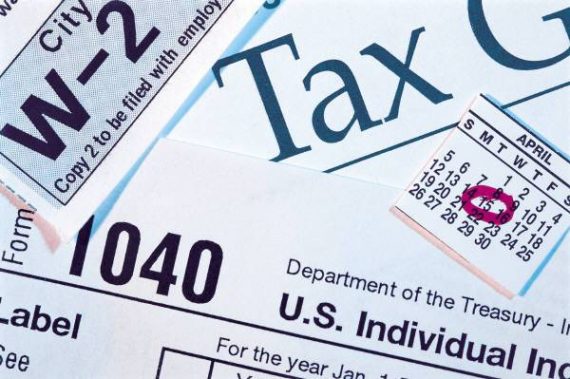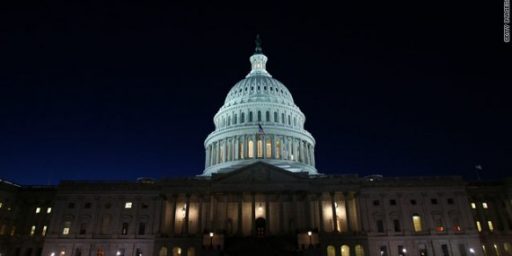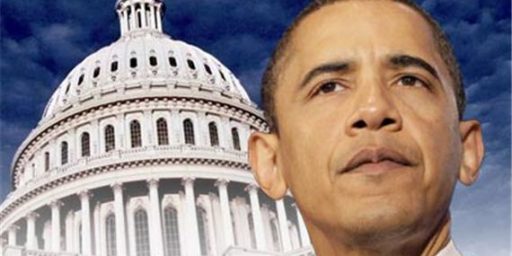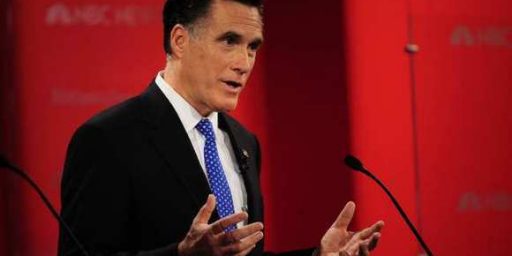Political Fight Over Expiring Bush Tax Cuts Heats Up
Congress and the White House are starting to stake out sides in the upcoming battle over extending the Bush tax cuts.
Along with the elections in November, now just 100 days away, there’s a political battle brewing in Washington over the expiration of the tax cuts that were put in place in 2001 and 2003:
WASHINGTON — An epic fight is brewing over what Congress and President Obama should do about the expiring Bush tax cuts, with such substantial economic and political consequences that it could shape the fall elections and fiscal policy for years to come.
Democratic leaders, including Mr. Obama, say they are intent on letting the tax cuts for the wealthy expire as scheduled at the end of this year. But they have pledged to continue the lower tax rates for individuals earning less than $200,000 and families earning less than $250,000 — what Democrats call the middle class.
Most Republicans want to extend the tax cuts for everyone, and some Democrats agree, saying it would be unwise to raise taxes on anyone while the economy remains weak. If no action is taken, taxes on income, dividends, capital gains and estates would all rise.
The issue has generated little public attention this year as Congress grappled with health care, financial regulation, energy, a Supreme Court nomination and other divisive topics. But it will move to the top of the agenda when lawmakers return to Washington in September from their summer recess, just as the midterm campaign gets under way in earnest. In recent days, intense discussions have begun at the Capitol.
Beyond the implications for family checkbooks, the tax fight will serve as a proxy for the bigger political clashes of the year, including the size of government and the best way of handling the tepid economic recovery.
“It has enormous ramifications for the fall and clearly will be one of the dominant issues,” said Senator Ron Wyden, Democrat of Oregon. “This is code for the role of the federal government, the debate over the size of government and the priorities of the nation.”
While the political divide is pretty clear — Republicans want to extend the tax cuts, Democrats don’t want to extend them for “wealthy” Americans — there has been some crossover:
Sen. Kent Conrad (N.D.), a Finance Committee member who also chairs the Budget Committee, said he would prefer to extend all the tax cuts, at least until the economy fully recovers.
“In a perfect world, I would not be cutting spending or raising taxes in the next 18 months to two years,” Conrad said.
Rep. Gerald E. Connolly (D-Va.), whose constituents are among the wealthiest in the nation, also wants to extend the upper-income tax breaks temporarily, arguing that the richest taxpayers are responsible for the bulk of consumer activity.
“If they close up their wallets and checkbooks and debit cards because they have less disposable income, this is the wrong time for that,” Connolly said. “This isn’t an argument for never, ever, ever. It’s an argument for not now.”
Still others — particularly vulnerable House members fighting to keep their seats in conservative districts — want to postpone any action until after the election. Paul Lindsay, spokesman for the National Republican Congressional Committee, which is in charge of electing House Republicans, said they are wise to be nervous.
“Democrats who have a hard time defending spending will have an even tougher time defending tax increases,” Lindsay said.
Indeed they will, which is why the Obama Administration is putting the idea of at least extending the tax cuts for what it calls “middle class” Americans, nobody wants to be accused to being in favor of tax hikes in the middle of what is, at best, an anemic economic recovery.
But what about extending them for everyone ? This morning Treasury Secretary Tim Geithner said that he didn’t believe that allowing marginal tax rates on wealthy Americans to increase would have a negative impact on the economy:
Since it seems unlikely that we’ll see any actual legislative action on this before Congress breaks for the campaign season, we’re either looking at some form of extension being taken up in a lame-duck session in November or, more likely, after the 112th Congress takes office in January. At that point, the debate will be influenced by three things, the state of the economy, the extent of the Republican gains in the mid-term elections and the political impact of the bipartisan Debt Commission, which will issue it’s report in December. For Democrats, it will be hard to argue against extending the tax cuts if, as expected, the economy is still weak. For Republicans, there will be pressure from some quarters for the party to actually put it’s money where it’s mouth is when it comes to deficit reduction, which may mean backing away from the idea that tax increases are always off the table.
In the end, I think we’re likely to see an extension that is closer to the Obama Administration’s proposal than not. Regardless of how well the Republicans do in the House in November, they’re not going to take control of the Senate, and, if they did that somehow, they surely aren’t going to come close to a filibuster proof majority. Just as we’ve seen in the past two years, the House’s version of tax cut extension is unlikely to make it through the Senate unscathed. The income levels may be raised — say, to $ 350,000 or so — but there will be some people benefiting from the Bush tax cuts now that will see their marginal rates go up in 2011. Whether that will have much of an impact on the economy is something that nobody can know in advance.







It’s a pity, because what the economy needs is a forward-looking plan for both revenue and spending.
You frame it a little more optimistically than I would. I see skirmishes from entrenched positions, rather than any attempt at an integrated budget and tax package. Sure, the battle-lines might move a bit on “tax cuts” and “cut-offs” and “the rich” but what is that in the big picture? Not so much.
Oh don’t get me wrong, this won’t be all that forward-looking. Nothing is in the Federal budget process.
Some people smarter than I have suggested changes like adopting two-year budgets that would require Congress to be more forward-looking, but I’m not sure that would work
Basically I think you’re right Doug, only the two top bands are going to expire. I’m not sure how Republicans win an argument when they are so clearly talking out of both sides of their mouth on deficit reduction and protecting tax cuts for folks who are, however you cut the mustard, in the top 1-2% of income earners in the country. Implicit in Republican rhetoric is the threat that if they don’t protect the top 1 or 2% they will try to prevent the Dems passing the legislation preventing expiry of the four lowest bands in the hope the Democrats will collect all the obloquoy for raising everyone’s taxes. This also seems a higly suspect notion given that the president has the bully pulpit at his disposal. But in their present state of mind, who knows they might try it.
***nobody wants to be accused to being in favor of tax hikes in the middle of what is, at best, an anemic economic recovery.***hehe…..
“I’m not sure how Republicans win an argument when they are so clearly talking out of both sides of their mouth on deficit reduction and protecting tax cuts ”
I think the Republicans share this fantasy with a majority of Americans.
If a majority of Americans want to be lied to about a policy issue, is the party that lies to them about it the bad guys?
heh
“Rep. Gerald E. Connolly (D-Va.), whose constituents are among the wealthiest in the nation, also wants to extend the upper-income tax breaks temporarily, arguing that the richest taxpayers are responsible for the bulk of consumer activity.”
Say what?
Taxing the rich will not employ the poor. Infact just the opposite. Most of the positions here are just stupid. Increasing taxes is a good idea for Democrats. I hope they raise the hell out of taxes on the rich. That is where most of the donations they got previously to this election came from. Bite the hand that feeds you and soon you have nothing to eat. 66% of Amicans are concerned with taxes. Raise them. Go ahead.
A 3% tax increase on the wealthy is going to cause them to quit their $250,000+ a year jobs, Zel?
They didn’t during the Reagan and Clinton economic booms when tax rates were higher.
Have the rich suddenly turned into drama queens?
NOT “Taxing the rich will not employ the poor. Infact just the opposite.”
The rich care about themselves.
Steve
ponce says:
Sunday, July 25, 2010 at 17:40
“A 3% tax increase on the wealthy is going to cause them to quit their $250,000+ a year jobs,”
It’s probably less than that. I did a few back of envelope calcs and it came out around 2.5% for couples making 250-500k and maxing deductions. It went to about 3.5% for couples making around a million.
To provide some context, I borrowed this from Ritholtz, because he’d placed the findings in list form; the info is from In ’08 Downturn, Some Managed to Eke Out Millions, which analyzes the SOI stats from the IRS.
– In 2008, Americans reported $8.4 trillion in total income, down 4.6% from 2007.
– Inflation adjusted, that is down 8.4% — the sharpest decline in total income since 1990.
– Biggest source of decline: Falls in Investment Income and sharp drops in Capital Gains.
– total wage and salary income was +1.9%; adjusted for inflation, it was -1.9%.
– Tax returns of $1 million plus fell by 22% to 321,294.
– 13,480 tax returns that reported income of more than $10 million — 36% smaller than the prior year.
– In the above $10m+ group, of the $400 billion in income was reported, only 19% came from wages and salaries, much less than cap gains (despite bad stock market).
– Tax returns with negative income (realized losses > than total income) leaped 31% to 2.5 million.
– 462 returns that reported some income from gambling, totaling 2.6 billion, or $5.6 million per return (average).
The story also contains this nugget:
Note from the list, there were 13, 480 returns that reported income of more than $10 million in the year.
Dammit, when oh when will we get our html functions back. Here’s the link I tried to put in the previious comment:
http://www.nytimes.com/2010/07/24/business/economy/24charts.html?_r=1
Dammit, when oh when will we get our html functions back.
Poor Republicans just can’t master the internets…
Poor Republicans just can’t master the internets…
Ummm, that would be internet , Mr. Technocrat.. No “s” . “Hey honey, could you call up our USB to see what the problem is? I can’t get on the internets.” 🙂
Not everyone speaks html or php.
Martin Wolf at the FT, who is not exactly your typical Kos left wing firebrand, has a brilliant dissection of the Republican party’s complete disinterest in fiscal responsibility or doing anything substantive about the deficit. He also makes the point that there is a nihilist faction in the GOP who would actually like to see a federal default regardless of the consequences for ordinary Americans. It’s worth a read because like most of his pieces it’s devastatingly accurate.
http://blogs.ft.com/martin-wolf-exchange/2010/07/25/the-political-genius-of-supply-side-economics/#more-506
“the internets” is an old joke at this point, but it’s amusing that Juneau forgets the origin:
Quantitative studies of the “Laffer Curve”, e.g. Uhlig’s, have suggested that the slope of the curve in the United States and where we are on it do not support the argument that we would benefit from further reducing taxes. If you’re a Keynesian or neo-Keynesian, you’re chary of tax increases during a recession. If that’s the case I’d suggest letting the “Bush tax cuts” lapse in favor of revenue-neutral cuts that are more carefully tailored to our actual economic circumstances. I think, for example, we should abolish the business income tax or at least allow current year expenses of all business spending in the United States with the exception of real estate (as is the case in all other OECD countries, IIRC).
Dave what do you think about Kevin’s Drum’s idea that FICA taxes be suspended for a length of time, six months or a year?
I think it’s an interesting idea but politically dangerous. It’s easy to attack as an assault against Social Security since it would hasten the system’s actuarial insolvency.
Additionally, I don’t honestly think that our economy’s problem is insufficient consumer spending which is what such a plan would encourage. I think our problems are insufficient business spending and excessive reliance on consumer spending.
“If you’re a Keynesian or neo-Keynesian, you’re chary of tax increases during a recession.”
Fully paid up Dave, but then we’re all Keynesians these days, ask GWB and his treasury sec. However, I agree with Geithner that letting the cuts lapse for the highest two bands won’t make an iota of difference to GDP one way or the other. The problem with your suggestion is that it probably requires legislation which aint going to happen.
Zeldorf,
Question for you mate.
You posit, “Taxing the rich will not employ the poor. In fact just the opposite. Most of the positions here are just stupid.”
Listen as$wipe, can we destroy your infantile argument once and for all.
If we are to believe your above dreck, please have a look at this historical table of marginal tax rates because I am about to stick your argument so far up you as$s that you will no longer have room for you head which is so firmly planted there.
http://www.irs.gov/pub/irs-soi/02inpetr.pdf
As you and your brain addled cohort (again my patience with conservative idiots is done) can plainly see, marginal rates on the rich and taxing the $hit out of them is as American as apple pie and punching no nothings like you in the face.
To wit: marginal rates all thru the 40s and 50s ranged from 81% to 91%, in the 60s and 70s it ranged from 70% to 91% and under your God Reagan the rate was 50%.
Excuse me if I am wrong, but those decades saw sustained growth with low unemployment So how in the f#^ck does your small mind come up with such gibberish as this:
“Taxing the rich will not employ the poor.”
You stupid bvastard, what about the the 40s thru the 80s, with high marginal rates on the rich providing plenty of jobs.
Please argue out of your as$# on this one.
Your whole reasoning has just been obliterated.
You see, you can tax the rich and still have a thriving economy.
Your turn weasel.
Really, how do you flat earthers survive, you must be a Trustafarian, you know living off daddy’s trust fund.